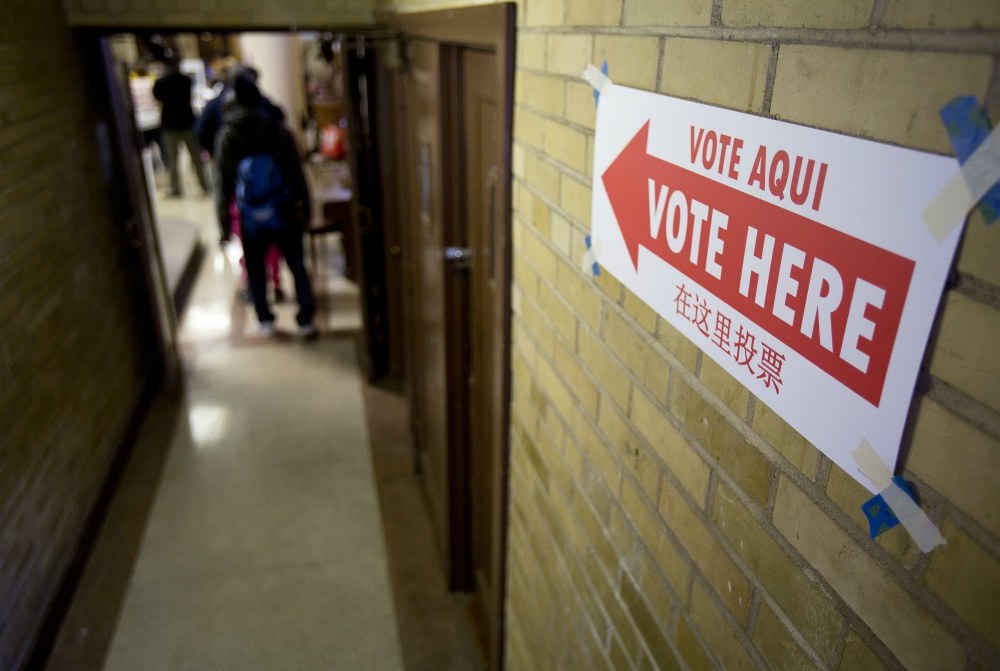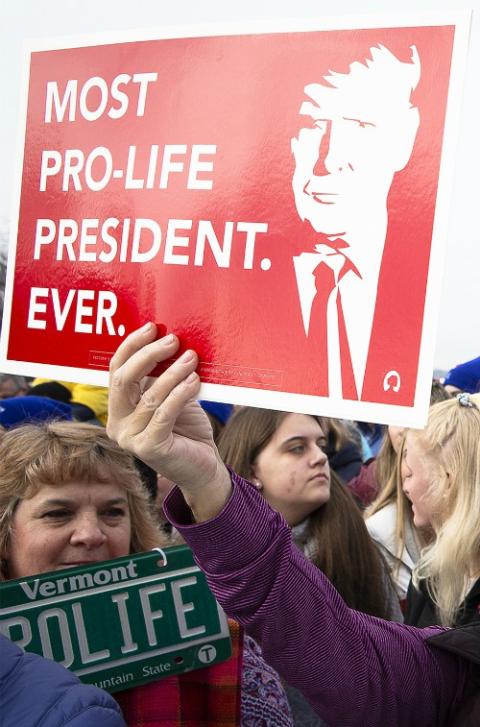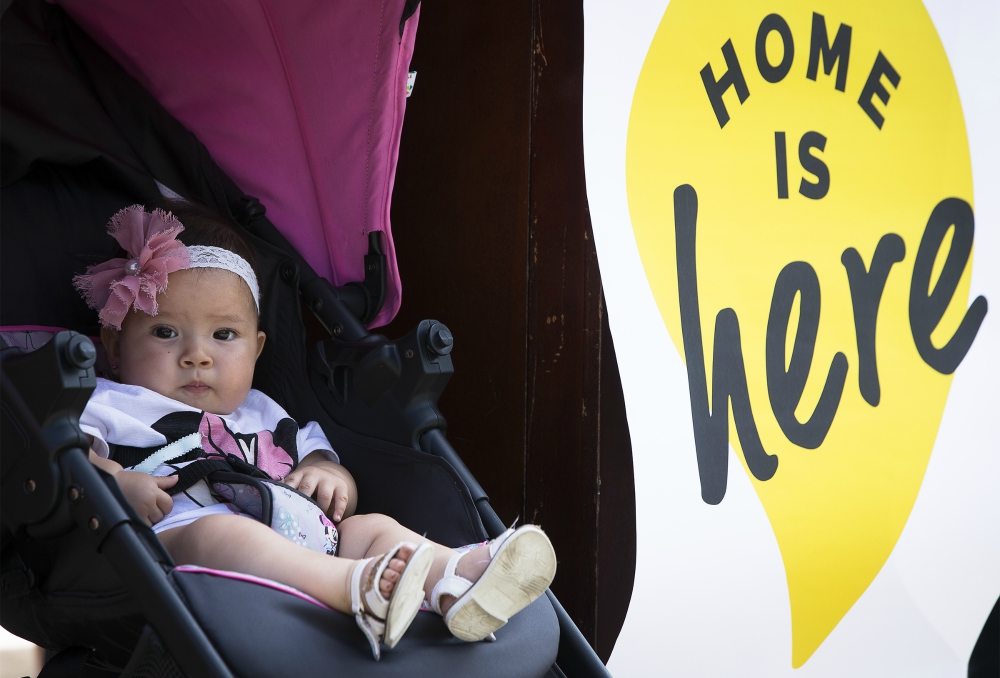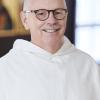
Voters enter the John Bailey Room at St. Francis Xavier Church in Washington Nov. 8, 2016. (CNS/Tyler Orsburn)
A recent NCR editorial, "Catholics and Trump, a reckoning," shone a light on a reality that deserves further scrutiny — the broad support Catholics have given a man whose narcissism, pettiness, cruelty, mendacity and lack of empathy are now widely acknowledged. He governs only through intimidation, personal attack (both ad hominem and ad feminam), innuendo and blame-shifting.
It is possible, of course, that a well-informed and conscientious voter could overlook these limitations and still judge such a candidate to be the best choice, all things considered. Yet it is hard for me to understand why someone would make such a tradeoff. What is in it for them? Do such tradeoffs jeopardize more fundamental aspects of our faith?
Let me suggest a few possibilities and then weigh them against what I see as fundamental Catholic principles.

A demonstrator holds an image of President Donald Trump during the March for Life rally in Washington Jan. 24. (CNS/Tyler Orsburn)
One reason might be simple economics. Catholics today are well-educated and more prosperous than ever. Perhaps we looked at our investments (at least until recently) and said, "My portfolio is great, the economy is roaring, unemployment is low. What's not to like?"
Or maybe we have been co-opted by widespread xenophobia and isolationism so that we believe America can be great only if we keep foreigners out. Have we allowed ourselves to believe that dark-skinned immigrants are criminals or a drain on the economy, or that they take jobs that should belong to Americans? This is ironic and scandalous for a faith group that was itself subject to discrimination and prejudice not that long ago. It is even more problematic if you recall that the majority of immigrants in question are Latino and Catholic.
Or perhaps these voters have been seduced by a fundamentalist pseudo-certainty that is in my mind nothing more than anti-intellectualism. The president has repeatedly dismissed scientific evidence and expert opinion in favor of hunches and guesses. This is easier than wrestling with science or with the ethical dimensions of complex political questions.
Some voters are culture warriors who believe that diversity, racial equality, political correctness, gay marriage, abortion, gender equality and other issues identified with liberal politics necessarily mean a slide into secularism that is at odds with their faith. They want a president who "tells it like it is," someone who dares to mock these ideas openly. They want a government that will protect their religious rights.
A well-intentioned voter could choose a candidate on the basis of these convictions. But here is why I believe that such a choice may run counter to several deeply held Catholic views.
Scripture
Many ardent supporters of this administration are conservative evangelicals who interpret Scripture literally, or who believe that it is the only dependable source of moral wisdom. Some have called the president "anointed" or "the chosen one" or compared him to King Cyrus of Persia, a pagan who was nonetheless sent by God to free the Jews. This theory is well-known. It is described in "The Trump Prophecy," a film that tells the story of Mark Taylor, a former firefighter who claims that God told him in 2011 that Donald Trump would be elected president.
For Catholics, there is only one truth, so we do not have to choose between the Bible and science; they are in dialogue, not in opposition.
This is not the Catholic approach to Scripture. We are cautious about drawing direct parallels between Scripture and current events. We believe that we can grasp God's plan through biblical revelation and also through science and rational reflection on human experience. For us, there is only one truth, so we do not have to choose between the Bible and science; they are in dialogue, not in opposition.
It is true that Catholics need to know the Bible better, but we cannot let Bible study threaten our fundamental conviction that God's plan is also mediated through creation and experience. Luke Timothy Johnson's recent book The Revelatory Body does a fine job of showing how this conviction has shaped our moral teaching. The fact that almost all of our moral teachings, especially on sexual morality, are based on natural law — reasoned reflection on human experience — rather than on the Bible alone says something about our confidence in reason.
Human dignity
We believe in human dignity, as many others do, but we also believe that this dignity can be fully realized only in community. Yet I think our commitment to this has been weakened by American individualism and individual rights.
The tendency toward single-issue politics reflects a certain kind of individualism. Advocacy for unborn life is an unquestionable value and many Catholics express that value by fighting for legal or judicial prohibition of abortion. Changing the law is a start, but it is largely meaningless unless we also believe that a child must be brought into a world that nurtures it and provides the social conditions necessary for the child to achieve its potential.

A baby is seen at a demonstration for the Deferred Action for Childhood Arrivals federal immigration program in Washington Oct. 2, 2019. (CNS/Tyler Orsburn)
The problem is that these social conditions involve many things that tend to be identified with a liberal agenda: better schools, universal health care, more income equality, child care, union wages, parental leave, etc. Yet many voters continue to support the legal/judicial approach to eliminating abortion because it keeps taxes low, keeps government small and doesn't involve a lot of expensive benefits to those who do not appear to deserve them. This view is impossible to reconcile with Catholic social teaching.
Political life
At least since Ronald Reagan, conservatives see government as a necessary evil. The less of it the better. Starve it and drown it in the bathtub, as the notorious anti-tax guy Grover Norquist said. Government and political life are clearly the result of sin.
The Catholic view is more sanguine. We do not want government for its own sake, but neither do we see it as evil. In the Catholic view, political life is a creative activity that enables us to live together. It is sometimes hard to see, but the whole purpose of political life is the common good, and the common good foreshadows the reign of God.
It is sometimes hard to see, but the whole purpose of political life is the common good, and the common good foreshadows the reign of God.
Thomas Aquinas made a remarkable statement when he asked whether there would have been government, or "dominion" before the Fall. Of course not, I thought. How could you need politics in paradise? But Aquinas said yes, even in paradise there would have been some kind of dominion because there would have had to be a way to distribute the goods of creation.
Granted the imperfection of our political system, it is the only means we have to create our life together, and the quality of that life here and now will prepare us for the fullness of life promised in the reign of God.
Economics
Many Trump supporters like his economic policies because they favor (sometimes) a free market and private enterprise. Nothing wrong with that, to a point. God seems to be all for hard work and even profit, and certainly Catholic social teaching supports our right to a decent living, a strong economy and a free market.
Here's the catch for Catholics. Our view of the human person is essentially social, so that my prosperity must always take account of the need of others. This is solidarity — the realization that human persons have a common destiny that we experience at least partly in this life.
This was the main message of liberation theologians. God's promise, they said, was not all about some heavenly world. It had to be visible even now, in real social and economic systems.
This means that a conscientious Catholic voter cannot be satisfied with low taxes and a high market return. The goods we have, including those we have earned by hard work, only belong to us in a sense. There is a logic of the market, to be sure, but there is also a "logic of gift," as Pope Benedict XVI noted in his encyclical Caritas in Veritate. This is not just charity, but justice, born of a conviction that the goods of the Earth belong to all, and that the poorest among us have the first claim on them.

Homeless people in Detroit get hot meals and other help at the Pope Francis Center May 1. (CNS/Jim West)
This understanding of economic realities also extends to immigration. I am not advocating for open borders, but I am suggesting that "this land is our land" only to a point. This is why the church has always supported migration of peoples. None of us has a radical claim on any piece of land. In the Catholic view, we are members of God's family before we are citizens. Borders are important and states have a right to establish them, but from God's point of view, they are provisional.
Grace
Everything I have said thus comes down to what I believe is the only theological question: What is the relationship between nature and grace? The Protestant theology that shaped the American ethos saw grace and nature as uneasy companions. It saw civilization and political life and human nature itself as essentially secular or even sinful. Grace must replace these fallen realities.
Strains of that theological thought persist today. This is why dramatic conversions are common among some groups of evangelical Christians, but not so much among Catholics. This dichotomization of nature and grace can also lead to a kind of sectarianism in which religious groups distance themselves from culture in order to assure integrity.
The Catholic view is different. We do not understand ourselves as a sect, separate from the world. We are a "big church" that for better or worse stands firmly in the world, and believes the world can be transformed. Because as a church we are so involved in the world, we must be careful about making religious freedom our rallying cry. Our moral values are also human values.
Advertisement
For us, anything that is is graced to some extent or at least radically open to grace. We see grace and human life as more compatible. Grace does not destroy nature, but perfects it.
This understanding of grace is the basis of our entire sacramental system. All our sacraments use real human persons and things to mediate grace, which means that these created things have a certain inherent dignity and goodness that is, in a sense, able to "cause" grace. There is nothing so secular that it is not apt matter for grace.
This is why we are optimistic about political life, optimistic about what we can know through reason and science, and why we place such high value on common good as a partial realization of the reign of God.
As we prepare to vote in November, let's ask ourselves what shapes our worldview and whether the tradeoffs we make are acceptable. Let's all take time to deepen our understanding of the Catholic teachings that make us who we are. These convictions contribute to a worldview that has some very clear ethical mandates. Let's not jeopardize the heart of our faith for short-term political gains.
[Dominican Fr. Charles Bouchard is senior director of theology and ethics at the Catholic Health Association.]







